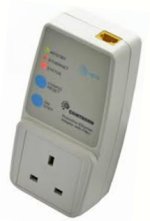 We’ve covered the subject of Powerline Adapters, a.k.a PLT, a.k.a. HomePlugs, and the interference that they can cause to the radio spectrum, on a number of our older radio shows.
We’ve covered the subject of Powerline Adapters, a.k.a PLT, a.k.a. HomePlugs, and the interference that they can cause to the radio spectrum, on a number of our older radio shows.
Powerline Adapters use a home’s mains wiring to distribute the Internet to other rooms in your home, but the radio interference that they generate, can be a problem for shortwave radio listeners as well as radio amateurs (of which our Pete is one)
Well, according to a report on The Register, the story has taken an interesting turn. One enterprising amateur radio operator used the UK’s Freedom of Information laws to force OfCom to release a report, commissioned by OfCom, that appears to confirm that the Comtrend Powerline Adapters (supplied with BT Vision) do cause interference and breach European EMC Directives.
Although Powerline Adapters have been proven to create interference, it seems that OfCom feels it’s “not in the public interest” to force a recall of these products, or to prevent them from being sold.
For the full story, see The Register
This is no small matter. Ofcom commissioned its own report into these devices back in 2008, and the report (from ERA Ltd, an authorised testing house) found that the emmissions from these devices were thousands of times over accepted, allowable limits and were capable of causing interference to radios and similar equipments over a wide area. Desptite this, Ofcom kept quiet, shelving the report and denying its existence.
Ofcom are now trying to say the limits are irrelevant in spite of the manufacturers (falsely) claiming they are compliant.
They are desparate to cover up for their lack of action and apparent complicity with BT Vision in particular.
In November 2008 I sent Ofcom a summary of a simple survey that confirmed in practice the interference caused.
Note that they ignored the RSGBs concerns made when the concept of
PLT was first mooted and didnt even bother to reply for over 2 years in spite of several reminders.
Note also that Ofcoms predecessors did a number of tests of PLT systems all caused interference.